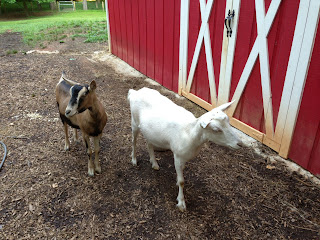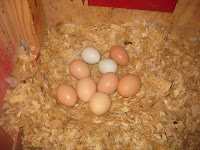Last week was one of the best weeks of the year for us here at Little Bent Creek Farm. It was the week we hosted a small flock of kids for a day camp aimed at teaching them about small-scale farming, sustainable living, and environmental responsibility. We had a blast! Mainly because the kids themselves were such adventurous, curious, and kind-hearted people.


Most of the photos here were taken by my multi-talented friend, Patti McKinnon, who helped me plan and organize the camp and who served as my primary assistant during the week. In addition to all those invaluable contributions, she also led the children in a "Farm Yoga" session each morning--a wonderful way to start our days together! Also helping me were Patti's oldest son, Niall, and my two daughters, Segi and Simi. Critical, too, to the camp's success was the support of Carolyn Walker, the founder and director of Woodland Discovery (www.woodlanddiscovery.org), which sponsored the camp and provided invaluable logistical support and resources. Thanks to all of you--and again, especially to the campers themselves--for making our week together so full of fun, learning, and adventure!

Each of the five days of the camp followed a theme. On Monday we asked the question, "What do farmers do?" The highlight of that day was going out to the barnyard
to do farm chores together: feeding the chickens; gathering eggs; feeding and grooming the goats; and feeding and petting the bunny. I've never seen kids enjoy work so much! I boiled the eggs the kids had gathered (along with a bunch of others) to offer them as a nutritious tip for their labor. Yum.
Afterwards, we sent everyone out into the woods to collect sticks and assigned them the task of constructing their own miniature barns and corrals out of those sticks, short lengths of twine, sheets of bark from our paper birch tree, and craft glue. (This project proved to be a tougher challenge than we'd bargained for, and helped us all appreciate the genius that early American farmers must have employed in building their own rustic barns and fences.)

On Tuesday, we explored how farm animals communicate with one another and learned about the importance of farmers learning to understand those patterns of communication. This time in the barnyard, the campers concentrated on watching and listening to the chickens, the goats, and the bunny and trying to interpret what they saw and heard. They also tried to see if they could effectively communicate their own messages to one or more of the animals. Later, when we came back together, they acted out and interpreted for the larger group the actions and sounds they had witnessed. Needless to say, we enjoyed some very creative performances! After this, the kids crafted model farm animals out of clay. (Patti later baked their little goats, pigs, chickens, horses, mice and snakes in her oven at home and returned them to their proud creators the next morning.)





On the third day, I taught the campers how to make homemade yeast bread. My own favorite part of this day came several minutes after I had explained how yeast is actually a living organism and that a central part of bread making involves waking it up and coaxing it to work for us. The kids, not surprisingly, were skeptical about this, and after several minutes passed with no action taking place in the bowl, they began to get fidgety. But then, suddenly--
WHOOSH--there it was: the bloom! "Wow!" They shouted. "That's crazy!" "How did it do that?!"
I also gave them a chance to grind whole kernels of wheat into a coarse flour; to feel, smell and taste the difference in whole wheat flour and white flour; and to mix a combination of these flours, along with a bit of salt, into the water and yeast. Later, they each got to knead and shape a small loaf of their own. During the second part of the morning, they made homemade butter to go on their bread loaves, vigorously shaking cream in small jars until it solidified. The loaves were baked and buttered just in time for their parents to pick them up. Mmmmm . . . I hope they shared a nibble or two!




Thursday was "We all need water" day. We began the day by discussing how dependent farmers are on having plenty of good, clean water for livestock and crops. We also talked about how important it is that farmers (and those of us who support them) make sure that farming practices don't pollute the waterways around us. Wildlife biologist Lenny Lampel (Natural Resources Coordinator at Mecklenburg County's Conservation Science Office), taught us about some of the creatures whose lives depend on those waterways and led us on an excursion into Little Bent Creek, where we uncovered and examined several of those creatures: crayfish, dragonfly nymphs, various small fish, salamanders, water boatmen, damselflies, and others. Then we returned to snack on watermelon and, of course, to visit our friends in the barnyard and tell them all about our adventures.





On Friday, the campers learned about organic gardening--why it is that some of us choose to cultivate our crops this way and how it differs from conventional farming. Then they got a tour of our vegetable, flower, and herb gardens and tried their hands at harvesting lettuce, green beans, garlic and herbs for their families. They went at this with gusto, stuffing their storage bags full of fragrant green produce to take home.
After a break to visit with the animals in the barnyard, they returned for an exercise in seed starting. First, we taught them how to make their own seed-starting pots from newspaper. They then filled these with organic potting soil. In one of these, they planted nasturtium seeds, and in the other green beans. Now they can do some "mini-farming" at home!
Our final activity of the week was to welcome the campers' parents, grandparents, and other special people to our backyard for a short Closing Ceremony. Here each camper was awarded a well-deserved "Honorary Farmer" certificate.
They were, indeed, a great group of "small farmers," and my family and I are grateful that they got to be a part of our own little farm for a week. Happy future farming, kids--
whatever that might mean!




























































